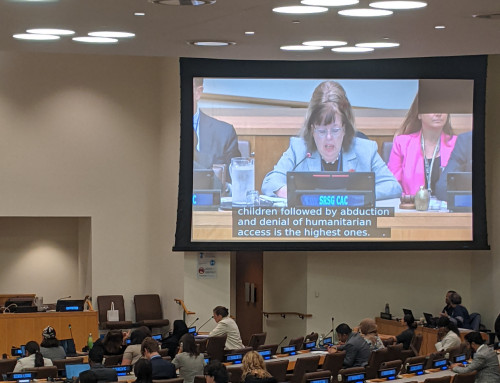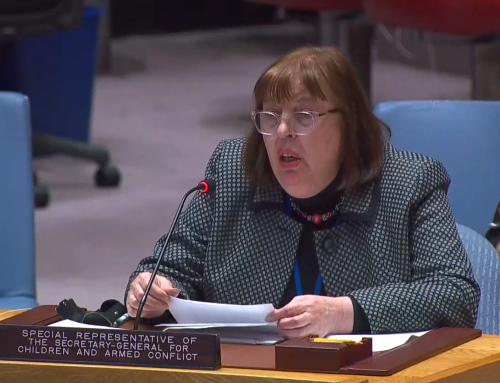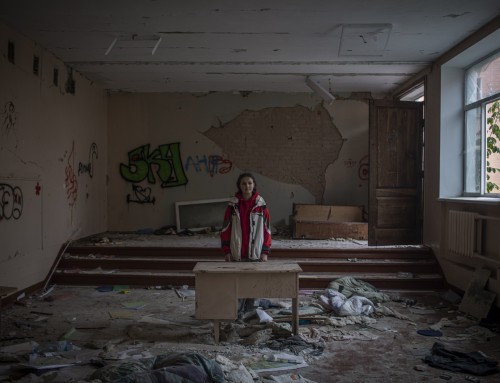Please check against delivery
Virtual remarks by Ms. Virginia Gamba, Special Representative of the UN Secretary-General for Children and Armed Conflict
Excellencies,
Ladies and Gentlemen,
It is a great honour for me to accept the Universities Network for Children and Armed Conflict 2021 International Award in my function as Special Representative of the United Nations Secretary-General for Children and Armed Conflict. Allow me to use this opportunity to also thank Italy, and the Senate of the Italian Republic, for supporting my mandate and hosting this event. It would have been a pleasure to be there with you in person, but I hope I will be able to meet you in Rome in the upcoming year.
This ceremony coronates one year of intense collaboration between my Office, in particular my Liaison Office in Brussels, and the Universities Network for Children and Armed Conflict. With the support of the Italian Ministry of Foreign Affairs and International Cooperation, the Network has been extremely active and created multiple opportunities for raising awareness about the risks children face in conflict-affected countries.
Throughout the year, I participated as a speaker in several events organized by the Network, and I also had the honor to open the Autumn Schools on “Building competencies and awareness on the international protection of children, particularly girls, affected by armed conflict“, that the Network co-organized with the Institute of Political Studies “S. Pio V”. My team worked closely with the Network and supported the development of multiple initiatives to strengthen the protection of war-affected children.
Boys and girls around the world keep suffering from the atrocities of conflicts that they did not have any role in creating. As reported in the 2021 Secretary-General Annual Report on children and armed conflict, the current number of grave violations against children is extremely concerning. 19,379 children were affected by multiple violations including recruitment and use, killing and maiming, rape and other forms of sexual violence and abduction. This is only the tip of the iceberg.
Many more children have seen their schools and hospitals attacked, looted, destroyed, or used for military purposes, with girls’ educational and health facilities targeted disproportionately. The disregard for children’s rights in war zones is shocking and the COVID-19 pandemic has put children at an increased risk of use and abuse in, for and by armed conflict. The most prevalent violations were the recruitment and use of children and the killing and maiming followed by the denial of humanitarian access. I am extremely alarmed at the increase in the abduction of children – 90% compared to previous years – as well as of rape and other forms of sexual violence – registering a 70% increase compared to previous years.
As we mark the 25th anniversary of my mandate, we have an unparalleled opportunity to not only look back at the achievements of the mandate but also to look ahead at new concerning trends and upcoming challenges that will require dedicated expertise and more attention from all of us. This includes, for example, the differential impact that grave violations have on conflict-affected boys and girls as well as on children with disabilities; the long-term impairments and different forms of disability caused by conflict, and the adverse impact of the climate emergency on conflict as a risk multiplier, and climate change as a root cause for conflict.
Ending and preventing grave violations against conflict-affected children must be at the center of our humanitarian, development and peacebuilding efforts. Failing to protect children amidst conflict will come at a heavy price not only for the children but for all of us.
More can and more must be done to uphold their rights. My Office and I cannot do this work alone.
The Member States, international and regional organizations, financial institutions, religious leaders and communities all have their part to contribute. Most importantly, we need well-trained child protection professionals on the ground to ensure the monitoring and reporting of grave violations against children and the implementation of child protection systems. This includes lawyers, doctors, psychologists, sociologists, judges, social workers, government officials, staff of non-governmental organizations, journalists and academics, amongst others.
Having been a Professor myself, I particularly value collaborating with academia and recognize the important role that universities play in leading research efforts on the issue of conflict-affected children and the filling of knowledge gaps. Universities also play a crucial role in contributing to the development of adequate academic curricula on the protection of children’s rights and training future professionals on promoting the protection of conflict-affected children.
The Universities Network for Children and Armed Conflict is a powerful force multiplier of the work of my Office. Not only does it bring together 40 universities and research centers from Europe, the Middle East, Africa, North and Latin America, including from conflict-affected countries, but it also unites like-minded professionals from around the world who want to know more about the protection of conflict-affected children and who wish to work towards that end.
Partnerships are central to my mandate. Without partnerships, I would not be here today to accept this award. It is because of this link between academia, international organizations, civil society and individuals working tirelessly towards our common goal of protecting conflict-affected children that I am honored to accept this international award as Special Representative of the Secretary-General for Children and Armed Conflict, alongside Ms. Rossella Miccio, President of Emergency, representing the crucial work of civil society on the ground, and of Mr. Mohamed Keita, capturing the plight of conflict-affected children through his photographs.
Together we are stronger advocates for the protection of children’s rights. I look forward to keep working together with all of you in the years ahead to ensure that war-affected children are not left behind.
I thank you for this award, for your courage and leadership in defense of these most vulnerable of children, and for your attention.





